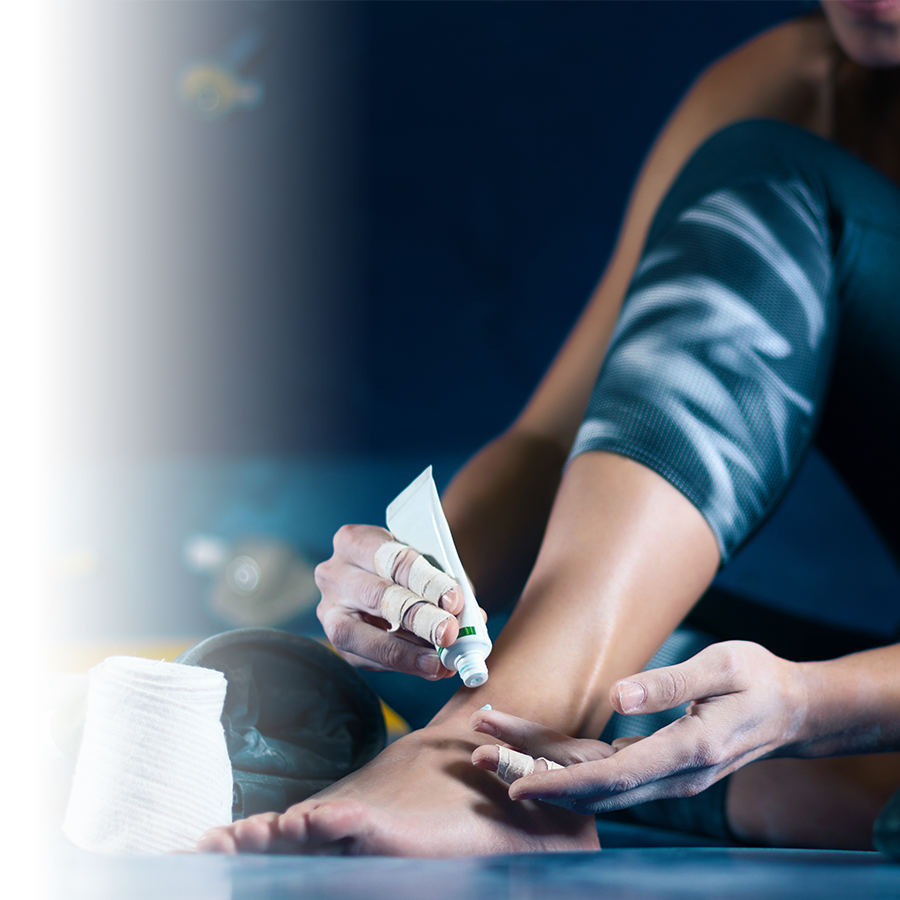Rigorous physical training sometimes involves minor skin issues. Find out how to avoid these unpleasant effects.
Intensive sports activities can sometimes lead to skin problems. Did you know that you can find products and articles at the pharmacy that can help prevent or treat these types of issues? You can also get advice from your pharmacist in this area.
The protective role of the skin
The skin, the body’s heaviest and largest organ, is the epicenter of several biological functions. Its main role is to protect the body against a number of assaults. Moreover, clear skin is the reflection of good health. Despite its protective functions, skin is vulnerable and several factors can undermine its integrity—extreme temperatures, chemical products, sun exposure, pollution, and so on.
Although physical activity generally promotes skin health, it can sometimes cause harmful effects, especially if it is intense or if it is practised outdoors. This can be explained by the simultaneous presence of several “aggressors” (heat or cold, excessive perspiration, chafing, etc.).
Skin issues
Here are the most common skin issues experienced by people who work out.
- Heat rash.Often observed in avid sports lovers, this rash is mostly due to heat, perspiration or sun exposure. It can appear anywhere on the body, especially in the hollows and folds of the skin.
- Hives, redness, and itching. Training can cause skin rashes like hives and redness, which are sometimes accompanied by itching.
- Skin irritations (and scrapes). Skin irritations occur especially due to the rubbing of skin against skin or skin against an object (seat, shoe, etc.). Cyclists, for example, may develop an irritation between the thighs or on the buttocks. The skin can be particularly irritated if it is moist, due to perspiration.
- Skin infections.Certain factors related to training and hygiene can increase the risk of skin infections. For example, workout gear can be contaminated by germs if it is not disinfected. Dermatomycosis (infection caused by fungus) is a good example of a common skin infection that affects sports lovers.
- Acne.Exercise usually has beneficial effects on acne. However, in some individuals, rigorous exercise can have the opposite effect and worsen an acne problem, whether it is on the face or in other areas (back, chest, or elsewhere).
- Sunburn.Anyone who trains outdoors without effective sun protection risks having a sunburn. Sunburns are one of the most common problems that affect sports lovers.
- Hyperpigmentation of the skin.People who spend a lot of time outdoors are prone to hyperpigmentation, which is manifested by the appearance of brown spots on the skin. This problem is especially due to overexposure to the sun.
- Premature aging of the skin.Sunrays can also accelerate aging of the skin, especially if the sun protection used is insufficient.
- Athlete’s foot.This is a widespread problem (especially on the toes) and is caused by fungus. Cracked skin and whitening of the skin between the toes can often be noted. Heat and humidity, caused by excessive perspiration, are risk factors for athlete’s foot.
- Blisters are often the result of a wound or from the skin rubbing against an object (i.e. a shoe, workout gear), and can form in various areas such as the back of the foot or on the hands. You should avoid bursting them, as they have a protective role.
Products available at the pharmacy
You will find a wide range of products able to prevent or treat workout-related skin issues at the pharmacy.
- absorbent powder
- antifungal products
- creams or ointments containing an antibiotic or cortisone
- gentle cleansers or moisturizers
- sunscreens
- dressings or pads
- etc.
If you develop a workout-related skin issue, speak to your pharmacist, who will be able to provide advice and help you choose the right products.
A few tips
The following steps can reduce the risk of workout-related skin issues.
- Shower immediately after your workout. Use a gentle cleanser and avoid using water that is too hot. Then, without rubbing, pat your skin dry with a clean towel.
- If possible, avoid working out when it is very hot or in a room that is not air-conditioned.
- Drink plenty of water before, during, and after your workout. Proper hydration helps to keep skin healthy.
- Apply a good quality moisturizer on your skin that is fragrance-free, once or twice a day.
- Protect your skin from the sun if you train outdoors.
- Apply a sunscreen that has a minimum SPF of 30, at least 30 minutes before you begin. Some sunscreens are especially formulated for sports enthusiasts.
- Wear a cap.
- Avoid working out between 11:00 a.m. and 4:00 p.m., when the sun is at its strongest.
- Wear adjusted clothing, but that isn’t too tight, ideally made with natural fibres.
- Thoroughly clean your workout gear before using it.
Pharmacists are always there to help and to answer any questions you may have about skin issues, whether or not they are related to training. Don’t hesitate to speak to your pharmacist.

